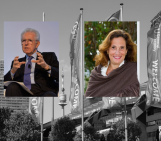
Scientific research is no doubt enriched by interdisciplinarity and collaborations which cross borders. This, combined with the scarcity of academic positions and the need to further ones horizons by experiencing varied research environments, leads many scientists to relocate (if only on a short term basis) to a country which is not their own. In today’s post, freelance science writer Robert Emberson explores the pros and cons of the nomadic lifestyle many researchers find themselves embracing in order to forward their work.
Scientists can consider themselves a lucky group of people. Having colleagues across the world working passionately at advancing the spectrum of human knowledge offers more opportunities to collaborate across national borders than perhaps any other field of human endeavour. Working with researchers of different nationalities is a chance to share ideas and experience; more often than not, the whole is greater than the sum of its parts.
In many cases though, this collaboration requires scientists to move their whole lives, temporarily or permanently, to new countries. Research on a given topic is almost never focused in one geographic region, and so a significant minority of scientists leave their homeland to pursue their careers. In September this year, the Twitter account @realscientists started a discussion about the implications of this movement, under the hashtag #migratingscientists. Many researchers shared inspirational and personal tales about their peripatetic lifestyles, and these brief snippets serve as a useful insight into the disruptive nature of crossing borders for work.
What are the deeper lessons we can take from scientists who migrate for work? What impact does it have on their scientific, and personal lives?
A recent analysis of published studies has suggested that migrating might well improve the career prospects of scientists. Sugimoto and colleagues analysed the citation scores of 14 million papers (between 2008 and 2015) from 16 million authors, and found that, in general, those written by scientists who moved country during that time have citation scores 40% higher than those by authors who remained put. Surprisingly, despite a perception that international collaboration is widespread, only 4% of the scientists in the dataset moved during the window of observation.
The perception of extensive movement for researchers may be coloured by science in the English-speaking world. Foreign-born researchers make up 27% of scientists or engineers in the USA, and 13% in the UK. These countries seem to benefit significantly in terms of the impact of the research produced within their borders; countries with greater mobility tend to produce more highly cited papers. It’s a mutually beneficial relationship, at least in terms of citations, and moreover researchers returning home can bring with them a wider network of colleagues, potentially boosting research and development in their own countries.
I spoke to the lead author, Professor Sugimoto, about these trends, and she told me that much of it comes down to what is available in these countries.
“Scholars do best when they have access to resources (personnel, infrastructure, and materials)”, she says. “Countries with high scientific capacity and investment also tend to have a critical mass of scholars. Collaboration has been linked to higher production and citation, so it is no surprise that those with access to enlarge their network are likely to be successful on these metrics.”
The US and UK are two countries where open borders are increasingly under attack. Immigration is always a hot-button topic, and while in both countries an opposition to immigration is not necessarily new, increased restrictions on immigration are now more likely with a Republican-led government in the US and Brexit in the UK. Already there are suggestions that researchers are increasingly looking elsewhere for positions; based on the studies, this could lead to a decline in the impact of research from these countries.
As shown by Prof Sugimoto and colleagues, scientists don’t exactly fit into the standard definition of immigrant. The researchers point toward mobility, rather than migration, as the important descriptive term here. Scientists tend to return to their home country after spending time abroad, and as such represent temporary migrants, rather than permanent. Social attitudes towards skilled workers tend to be different to those surrounding long-term immigrants and it would benefit researchers if policymakers went out of their way to emphasise that scientists fit into this category.
According to Professor Sugimoto, the short-term nature of mobility is what is most beneficial.
“Unless these scholars maintain ties with their home countries, emigration is likely to yield to deficits for other countries. Circulation, on the other hand, should yield benefits for all countries. Short-term stays can establish ties and provide an influx of resources, without necessarily removing scholars from their home networks.”
Treating scientists as visiting experts, then, is perhaps a more productive way forward.
But immigration visas and increases in citation indices are just one side of the story for scientists. Reading through some of the tweets tagged with #migratingscientists, many focus on the upheaval of their personal lives, for better or worse. It’s sometimes too easy to think about researchers as ‘human capital,’ but each of those humans have personal connections and a definition of home. Some studies suggest that foreign-born researchers may be more productive than their home-grown counterparts, but their satisfaction with life tends to be lower. What’s the deal?
Maslow’s hierarchy of needs, a framework commonly used in sociology to understand the different human requirements and personal development, suggests that the human need for Belonging is more fundamental than the requirement for Self-fulfilment. In other words, before researchers can genuinely accomplish their best work, they have a more basic need for a network of friends and family to belong to, or a place to call home. Finding this sense of belonging can be tricky in a foreign country. Language barriers can make it a struggle to meet new friends, and cultural tropes and mores may be more difficult to transcend than it first seems too, particularly when attitudes towards the researcher’s race or gender differ.
Early career researchers on short-term contracts may also struggle to maintain a sense of belonging to a particular place; extensive travel and fieldwork can exacerbate this. As a PhD student, living in a foreign country and travelling for labwork, field campaigns and conferences I sometimes felt like George Clooney’s character in the film Up in the Air, where he struggles with a life lived out of a backpack and in airport lounges.
Migrating scientists must make choices about close personal relationships; should they leave a partner behind or try to make it work long-distance? It’s doubly difficult to find positions for two people, let alone moving a more extended family. Many of the stories on twitter stress the importance of supportive partner or family.
Pay may also be lower for foreign-born scientists, too. Despite their outsize contribution to research output, foreign scientists in the US may be paid less than their peers, both in terms of salary, and the availability of funding sources. These hurdles make an already tricky transition to a new country significantly harder.
So it seems the research impact on a national and individual scale may benefit from increased mobility of researchers, but at the same time the personal tribulations may make this a challenge for many scientists.
How do scientists weigh up these pros and cons? Well, if Twitter is anything to go on, they’re clearly an enthusiastic bunch of folks, since many of the stories tend to emphasise the fun had along the way, as well as the positive experiences.
https://twitter.com/brown_birds/status/910471602755731456
Given that these nitty-gritty questions about personal experience are unsurprisingly hard to quantify, our understanding of the impact of mobility on scientists personal lives is often based on these kind of anecdotes; it would be greatly beneficial to survey researchers more widely to ascertain what kind of systematic effects migration induces. A more qualified comparison with the citation-based indices would then be feasible.
For now, even if removing the obstacles to scientists moving across borders may raise questions amongst some policymakers, it would reduce the negative connotations of migrating for research – which might allow for wider collaboration, and a more effective global body of scientists.
By Robert Emberson, freelance science writer
Editor’s note: This is a guest blog post that expresses the opinion of its author, whose views may differ from those of the European Geosciences Union. We hope the post can serve to generate discussion and a civilised debate amongst our readers.




